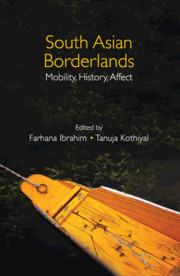Book contents
- Frontmatter
- Contents
- List of Figures and Tables
- Acknowledgements
- Introduction
- 1 Paradise at the Frontier: Kashmir as a Political Terrain and Literary Landscape in the Mughal Empire
- 2 Borders in the Age of Empire and Nation-States: The Honeycomb of Borderlands: Kumaun, Western Tibet and Far Western Nepal
- 3 Borders, Difference, Recognition: On the Cause(s) of Gorkhaland
- 4 Embattled Frontiers and Emerging Spaces: Transformation of the Tawang Border
- 5 Relative Intimacies: Belonging and Difference in Transnational Families across the Bengal Borderland
- 6 Reading Parijat in Nepal: The Poetics of Radical Feminism Negotiating Self and Nation
- 7 Commodity Journeys and Market Circuits: Making Borders ‘Natural’ in Colonial Western Himalayas
- 8 Frontiers, State and Banditry in the Thar Desert in the Nineteenth Century
- 9 Bureaucracy and Border Control: Ethnographic Perspectives on Crime, Police Reform and ‘National Security’ in Kutch, 1948–52
- 10 Frontier as Resource: Law, Crime and Sovereignty on the Margins of Empire
- About the Contributors
- Index
8 - Frontiers, State and Banditry in the Thar Desert in the Nineteenth Century
Published online by Cambridge University Press: 17 September 2021
- Frontmatter
- Contents
- List of Figures and Tables
- Acknowledgements
- Introduction
- 1 Paradise at the Frontier: Kashmir as a Political Terrain and Literary Landscape in the Mughal Empire
- 2 Borders in the Age of Empire and Nation-States: The Honeycomb of Borderlands: Kumaun, Western Tibet and Far Western Nepal
- 3 Borders, Difference, Recognition: On the Cause(s) of Gorkhaland
- 4 Embattled Frontiers and Emerging Spaces: Transformation of the Tawang Border
- 5 Relative Intimacies: Belonging and Difference in Transnational Families across the Bengal Borderland
- 6 Reading Parijat in Nepal: The Poetics of Radical Feminism Negotiating Self and Nation
- 7 Commodity Journeys and Market Circuits: Making Borders ‘Natural’ in Colonial Western Himalayas
- 8 Frontiers, State and Banditry in the Thar Desert in the Nineteenth Century
- 9 Bureaucracy and Border Control: Ethnographic Perspectives on Crime, Police Reform and ‘National Security’ in Kutch, 1948–52
- 10 Frontier as Resource: Law, Crime and Sovereignty on the Margins of Empire
- About the Contributors
- Index
Summary
This chapter explores British engagement with banditry on the frontiers of the Thar Desert in the mid-nineteenth century. The extension of direct and indirect British rule over various parts of the Thar Desert made them encounter a range of groups engaged in banditry, highway robbery and plunder along the ill-defined frontiers of princely states and British territories. These encounters highlighted arguments about criminality, jurisdiction, legality, nomadism, settlement and governance in the Thar, which was viewed as a harsh and adversarial geography peopled by refractory nomadic groups. British records of early nineteenth and mid-nineteenth century view banditry through the lens of criminality, as a lawand- order problem that could be resolved through better administration, mapping, policing, as well as through a criminal justice system focused on retribution. However, in their encounters with ‘criminality’, British administrators were often faced with rather complex histories of ‘bandits’ and their complicated relationships with polity in the desert.
In contrast to the colonial view, recent approaches to banditry view it as a social and political response to exploitation. Banditry, as pointed out by Eric Hobsbawm in his classic Bandits, cannot be understood except as part of a history of political power (2000: 13). Stewart Gordon argues that a structured ‘plunder ethic’ centred around the accumulation of economic resources remained central to eighteenth-century state formation in Malwa (1999: 416–29). In her study of dakaiti in Bundelkhand, Malavika Kasturi views banditry as a ‘multi-layered response by biradaris to the British attack on their territory, power, honour, means of subsistence, and military “masculine” culture’ (2000: 203). Norbert Peabody’s exploration of Rajput kingship in Kota views rebellion as a defining feature of Hindu kingship, which allowed Rajput jagirdars to assert their authority in the circle of kings which was the Rajput kingdom (1991: 29–56). Shail Mayaram’s understanding of Meo banditry views it as resistance to state formation, one that forms a part of a dialectic between state and ‘anti-state’ (2004: 181). While being different representations of rebellion, what these examples do underline is a seamless intermingling of categories of the bandit and the rebel, and their locations on the margins of dominant state formations. Rather than being an act of criminality, banditry and plunder almost appear as part of a moral claim, whereby bandits locate themselves in hostile geographical and political frontiers and posit challenges to the state.
- Type
- Chapter
- Information
- South Asian BorderlandsMobility, History, Affect, pp. 196 - 213Publisher: Cambridge University PressPrint publication year: 2021
- 1
- Cited by



